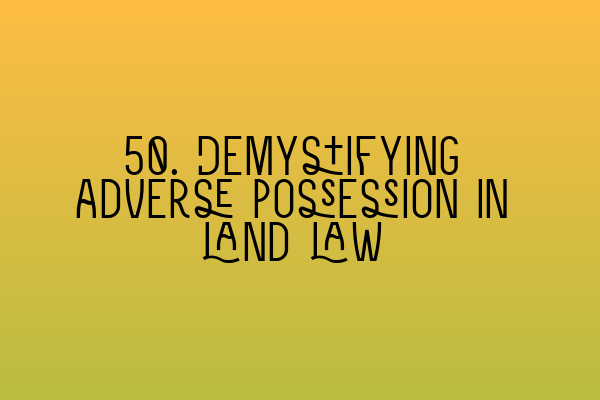50. Demystifying Adverse Possession in Land Law
Welcome to the SQE Property Law & Land Law blog, where we provide comprehensive information on various legal topics. In this blog post, we will demystify the concept of adverse possession in land law. Adverse possession is a complex area that often raises confusion and questions, but we’re here to break it down for you.
What is Adverse Possession?
Adverse possession is a legal principle that allows a person to acquire ownership rights to someone else’s land through continuous and exclusive possession for a specified period of time. The concept is rooted in the idea that if someone possesses land for an extended period without interference from the true owner, they should be rewarded with ownership rights.
Elements of Adverse Possession:
For adverse possession to be successful, certain elements must be met:
1. Actual Possession: The claimant must physically possess the land and treat it as their own. They should demonstrate their intention to exclude others from the land.
2. Exclusive Possession: The claimant must possess the land exclusively, without sharing possession with the true owner or other occupants.
3. Open and Notorious Possession: The possession of the land must be visible and manifest to the public, such that the true owner should reasonably be aware of it.
4. Continuous Possession: The possession must be continuous for a specified period, which is generally 12 years, but can vary depending on the circumstances.
5. Hostile Possession: The possession must be without the permission of the true owner. The claimant must possess the land with the belief that they have the right to do so, even if their belief is mistaken.
The Application Process:
To acquire ownership rights through adverse possession, the claimant must apply to the Land Registry using Form ADV1. The application must provide evidence to support each element of adverse possession and demonstrate compliance with the statutory requirements.
Overcoming Challenges:
Adverse possession can be a contentious issue, as it involves depriving the true owner of their land. Therefore, the true owner has the opportunity to challenge the claim. Common challenges include proving that the possession was not continuous, that the possession was permissive, or that the claimant did not meet all the necessary elements.
Implications of Successful Adverse Possession:
If the claimant successfully establishes adverse possession, they become the legal owner of the land, and their title is recorded in the Land Registry. The true owner loses their rights to the land, and it becomes the possession of the adverse possessor.
Conclusion:
Adverse possession is a complex area of land law that requires a thorough understanding of its elements and application process. While it can be a contentious issue, it serves as an important mechanism to ensure land is put to productive use. If you have any questions or require legal advice regarding adverse possession, don’t hesitate to contact us at SQE Property Law & Land Law.
For more information on SQE preparation, practice exams, and exam dates, check out our related articles:
– SQE 1 Practice Exam Questions
– SQE 1 Practice Mocks FLK1 FLK2
– SQE 2 Preparation Courses
– SQE 1 Preparation Courses
– SRA SQE Exam Dates
We are here to support you on your legal journey and provide you with the resources you need to succeed. Stay tuned for more informative blog posts from SQE Property Law & Land Law.
Disclaimer: The information provided in this blog post is for general informational purposes only and should not be taken as legal advice.
